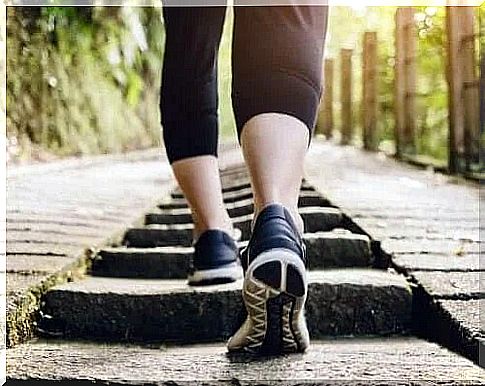Walking After Dinner: Is It Beneficial?

Walking has many health benefits. It is a simple exercise that keeps the heart healthy, helps burn calories and can improve mood. However, is walking after dinner healthy? Although some studies suggest that it is beneficial, others question the claim.
In this article, we will share with you the possible effects of walking after a meal, a common practice that seems to have both advantages and disadvantages. Keep reading to find out more useful information!
Walking after a meal: possible benefits
A key point in managing diabetes is regular physical activity. A study of patients with type 2 diabetes found that the blood sugar of those who walked after the main meals of the day was lower than that of patients who walked only once a day.
The results of this study suggest that restricting carbohydrates and taking a short walk of about 10 minutes after each meal may help reduce the likelihood of excessive blood sugar.
Another study published in the journal Diabetes Care shows that short, intermittent periods of eating after meals are an effective way to control postprandial hyperglycemia in the elderly.

In contrast, an article published in the Journal of Nutrition states that walking after meals does not have beneficial effects on blood sugar in older adults at risk of cardiovascular disease.
Exercise plays an important role in maintaining heart health. Walking daily can reduce the risk of heart disease. In fact, according to a study in the journal Current Opinion in Cardiology, walking supports cardiovascular health, circulation and blood pressure.
Walking after dinner seems to be a good way to take care of our heart. The World Health Organization (WHO) states that young people between the ages of 5 and 17 should accumulate at least 60 minutes of moderate-intensity physical activity daily, while adults between the ages of 18 and 64 should you should do at least 150 minutes of moderate-intensity aerobics throughout the week (about 30 minutes a day).
According to an article in the journal BioMed Research International, walking after meals can improve digestion due to the anti-inflammatory effects of physical activity. When you exercise, there is a reduction in visceral fat and metabolic changes in lipids and glucose, which can reduce inflammatory conditions.
In addition, experts believe that exercise facilitates intestinal transit due to improved digestion and absorption of nutrients, according to a study published in the World Journal of Clinical Cases.
Despite these studies, we must emphasize that more research is needed to confirm the effectiveness of walking in improving digestion.
Possible side effects
There is not much evidence of the side effects of walking after a meal. However, some people have annoying symptoms. Below, we will detail them.

According to a study called “The Influence of Lifestyle in Patients with Gastroesophageal Reflux Disease”, exercise can cause symptoms of acid reflux (heartburn and acid regurgitation). According to him, the more intense the physical activity, the more frequent the reflux episodes.
Tips for walking after meals









